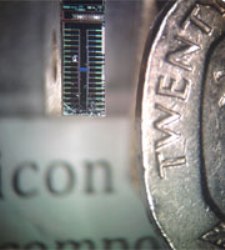In a significant step towards practical realization of quantum computing, scientists who are part of a collaborative team led by University of Bristol in UK have developed silicon-based quantum circuits that could lead the way to mass production of new quantum technologies.

A silicon quantum chip sample next to a 20 pence coin
The use of silicon-based circuits in the place of glass based circuits for the fabrication of quantum technologies has the major benefit of facilitating easy integration of quantum circuits with traditional microelectronic circuits which have always been silicon-based.
Though the international team of researchers has built the quantum chip from silicon, the stuff small electrical processors in smart phones and computers are made of, the functioning of quantum circuits is different from standard electrical circuits. Traditional silicon chips function by controlling the electric current flowing through them. Quantum silicon chips function by controlling photons, which are single light particles. The quantum silicon circuits employ quantum mechanical effects like entanglement, the strong relationship between particles which would have no correlation in standard physics, and the phenomenon of superposition, the ability of a particle to exist in two locations at the same time. Since the manufacturing technique comprising the silicon-on-insulator material system adopted is the same as that for microelectronics, it could be scaled up to mass manufacture silicon quantum chips and may even lead to the development of hybrid microprocessors combining conventional and quantum components. Owing to the devices’ compatibility with optical fiber networks, they can be installed along with the internet. Since the researchers have managed to develop light manipulating silicon circuits 1000 times smaller than glass-based chips, the new quantum chip can be included as a part of devices which was previously considered to be difficult to achieve with glass chips.
Disclaimer: The views expressed here are those of the author expressed in their private capacity and do not necessarily represent the views of AZoM.com Limited T/A AZoNetwork the owner and operator of this website. This disclaimer forms part of the Terms and conditions of use of this website.